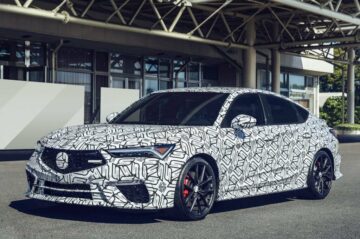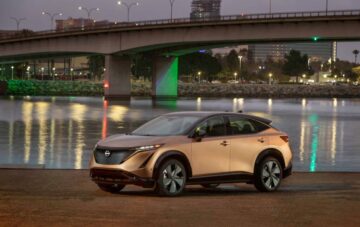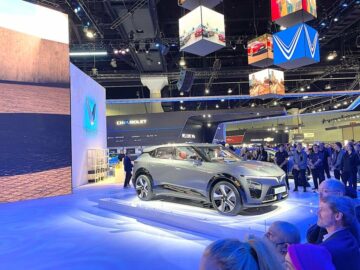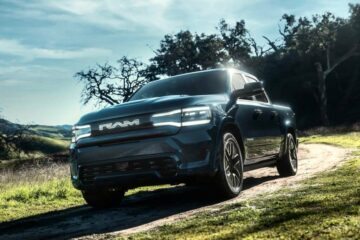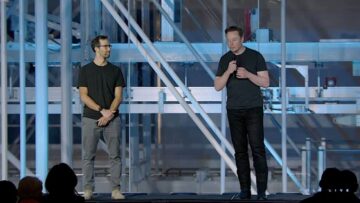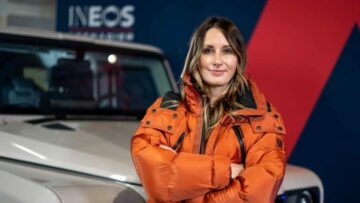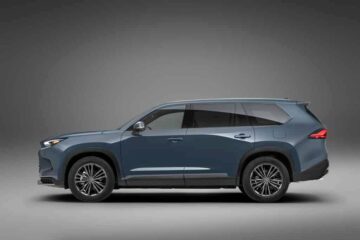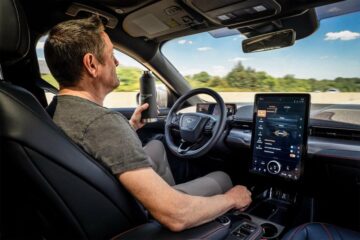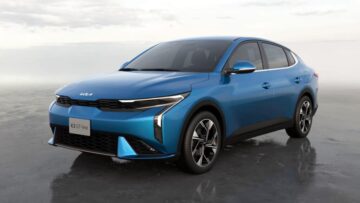Volkswagen is set to triple the number of all-electric models it’s offering in the U.S., adding the ID.Buzz microbus and the ID.7 sedan to the current ID.4 crossover. And, looking forward, there’ll be even more coming by mid-decade, according to Thomas Schäfer, the CEO of the Volkswagen brand.
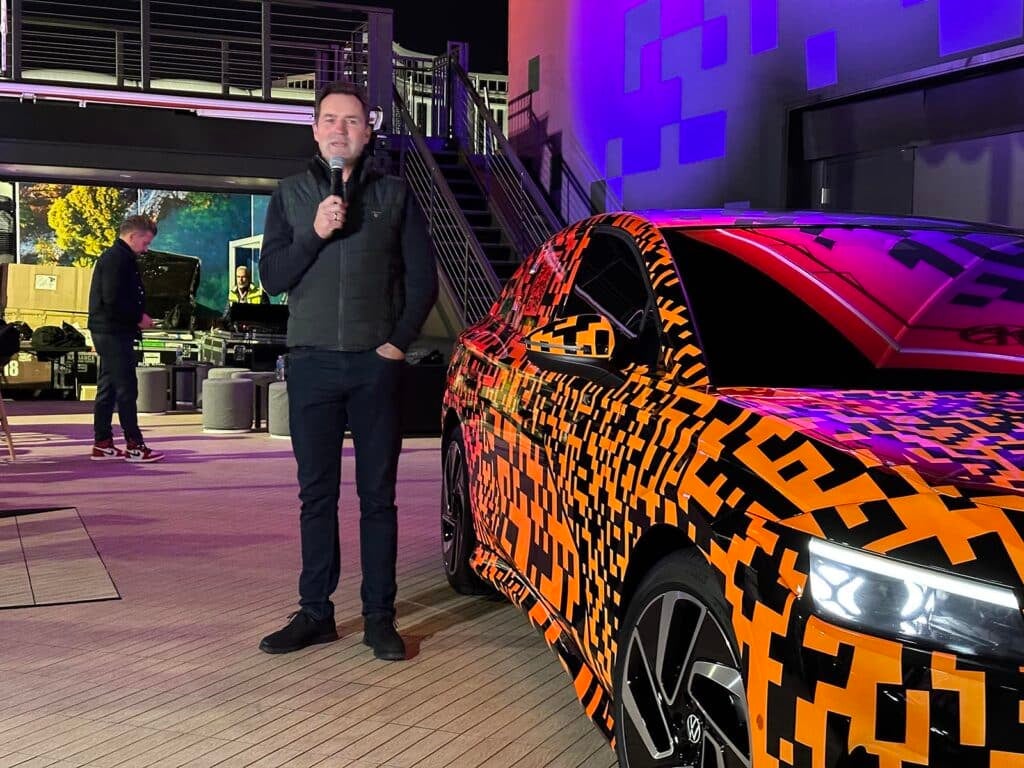
The German automaker also plans to expand the number of EVs it builds in the U.S. But the precise number likely won’t be nailed down until next month, during a corporate meeting that will lay out EV strategy for the next decade, Schäfer said during an exclusive interview. The executive was in Las Vegas when he met with TheDetroitBureau.com after introducing a pre-production version of the ID.7 at CES 2023.
Trained as a mechanical engineer, Schäfer spent a decade working with Daimler AG in a variety of roles, among other things overseeing quality in the U.S., Germany and China. He joined Volkswagen AG in 2012 and spent about five years as the company’s top executive in South Africa. Schäfer took on his current role in July 2022 following a shake-up that saw the ouster of Herbert Diess. Here’s a transcript of our conversation, edited for clarity and brevity.
TheDetroitBureau: You’ve introduced a camouflaged version of the ID.7 sedan here in Las Vegas. What role will it play as one of VW’s new EV products?
Schäfer: Yeah, that car will be one of our global cars and will launch first in China, then in Europe and in the U.S. It’s very important for us because it’s like a long-range sedan with up to 700 kilometer range (using the global WLTP standard), with great space inside. So, it will really stretch our (MEB EV) platform to the upper limits, and we’re very excited that we can now bring it to the road.
TDB: How important is it for the U.S. market where sedan sales have shrunk and buyers have migrated by the millions to SUVs and crossovers?
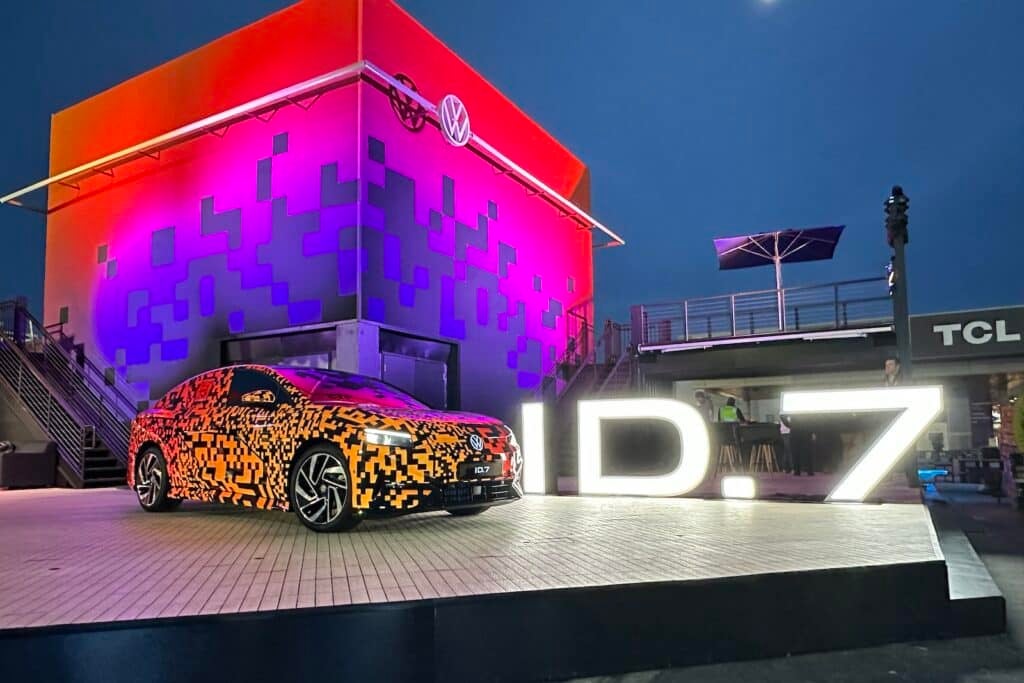
Schäfer: The sedan market is not dead from our point of view.
TDB: The ID.7 will reach the U.S. in the second half of 2024?
Schäfer: Yes, that is correct.
TDB: You originally weren’t launching very many EVs in the U.S. market but now seem ready to get more aggressive. Why?
Schäfer: Well, I think the U.S. has actually gone over the tipping point and what we see in in the forecasts and also the consumer preference is that electric mobility has really become mainstream. I would say there’s no turning back and, you know, we have a great opportunity to make a more significant stance on the American market (with EVs), rather than with internal combustion engines.
TDB: So, let me ask you to look out ahead to 2025, and then to 2030. How many EVs will the VW brand have globally, and how many in the U.S.?
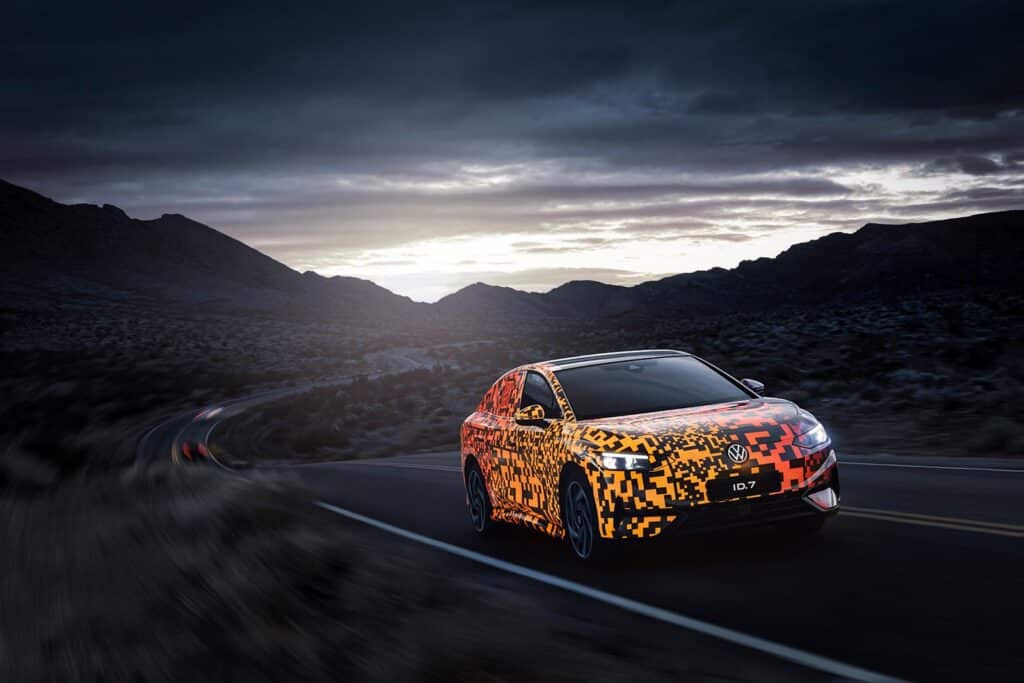
Schäfer: For the United States, probably by 2025 I’d say at least three to four. Globally, another three or four on top of the six we already have. By 2030, basically, 75% to 80% of our model range will be electric worldwide. Exact numbers are hard to say because we are trying to focus the model line-up and not have as many variants as in the past.
TDB: Are there any plans to build a VW electric pickup? There’s been a lot of talk about that possibility.
Schäfer: Well, not yet, but forever is not excluded. Might we think about it? Why not? The U.S. is a pickup market, but for now it’s not our priority.
TDB: VW has long struggled to really gain traction in the U.S. Do you see electrics as the key to really making it work?
Schäfer: I do think so. At the moment, our success is due to great SUVs, the Atlas, Atlas Cross Sport and Tiguan. Going forward, the way the government is supporting electromobility, that’s the only way to go. There is no option, otherwise.
TDB: Which raises the question of the new EV incentive rules (which limit what models will get incentives). Will you have to accept that some VW EVs won’t get incentives? If not, how can you solve that problem?
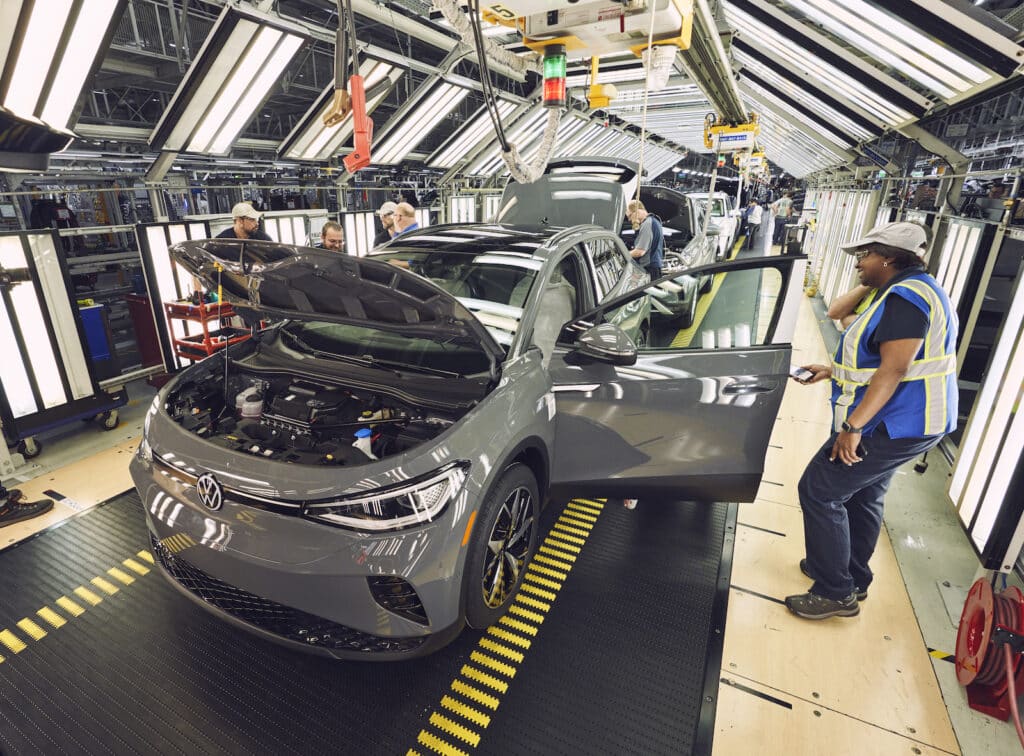
Schäfer: Obviously, we’re trying to get as (many EVs) as we can in the incentive scheme. There’s also this discussion between the U.S. and Europe to see how we can avoid being excluded. But we’re trying to get all our models focused on the U.S., like the ID.4 (built) in the U.S. That’s got to be the end game, obviously. But the question is what does the group do (including brands like Audi and Porsche). There could be synergies to use one of their factories. But it’s clear the future for us is electric in the U.S.
TDB: You tooled your Chattanooga plant to add a second EV. Can you tell us what that will be and when you will announce it?
Schäfer: Too early to say, but probably by the middle of this year. Currently, we’re going through the cycle plan through 2032 and it’s all being revised. It will probably be finalized by February this year.
TDB: You’ve delayed until 2028 plans to introduce a more advanced platform, the SSP, and will stretch out the MEB by updating it and calling it MEB+. Why?
Schäfer: The current MEB platform is great but it will not be able to last until 2030 without an upgrade. After 2025 we need an upgrade in terms of range and charging speed and that’s the MEB+. The next jump, especially with autonomous driving, you need a centralized electrical system.
TDB: Was the delay of the SSP platform due to problems developing the software or hardware?
Schäfer: It’s more the software and getting it handled on a group level. We have the architecture. But we now have to have the software ready for each launch and we can only do so much. We have to wait til February when we plan it all out.
TDB: Let’s wrap up with a question about your relationship with Ford. You have a number of joint ventures. Might there be more to come?
Schäfer: “We’re very happy. It’s a good, good collaboration. For one thing they get the MEB platform from us (for several Ford products in Europe), and there are a couple other projects. But there’s no expectation to expand from there.
- SEO Powered Content & PR Distribution. Get Amplified Today.
- Platoblockchain. Web3 Metaverse Intelligence. Knowledge Amplified. Access Here.
- Source: https://www.thedetroitbureau.com/2023/01/qa-vw-global-brand-ceo-thomas-schafer-sees-more-evs-coming-to-the-u-s-and-more-built-here/
- 2012
- 2022
- 2023
- 2024
- 7
- a
- Able
- About
- about IT
- Accept
- According
- actually
- advanced
- africa
- After
- AG
- aggressive
- ahead
- All
- all-electric
- already
- American
- among
- and
- Announce
- Another
- architecture
- atlas
- audi
- autonomous
- back
- Basically
- because
- become
- being
- belief
- between
- brand
- brands
- bring
- build
- builds
- built
- buyers
- calling
- car
- cars
- centralized
- ceo
- Ces
- charge
- charging
- China
- clarity
- clear
- collaboration
- COM
- come
- coming
- Company’s
- consumer
- Conversation
- Corporate
- could
- Couple
- Cross
- Current
- Currently
- Daimler
- dead
- decade
- delay
- Delayed
- developing
- discussion
- down
- driving
- during
- each
- Early
- Electric
- engineer
- Engines
- especially
- Europe
- EV
- Even
- excited
- excluded
- Exclusive
- executive
- Expand
- expectation
- factories
- finalized
- First
- Focus
- focused
- following
- Ford
- forever
- Forward
- from
- full
- future
- Gain
- game
- German
- Germany
- get
- getting
- Global
- Globally
- Go
- going
- good
- Government
- great
- Group
- Half
- happy
- Hard
- Hardware
- here
- How
- HTTPS
- important
- in
- Incentive
- Incentives
- Including
- internal
- Interview
- introduce
- introduced
- IT
- joined
- joint ventures
- July
- jump
- Key
- Know
- Las Vegas
- Last
- launch
- launching
- Level
- likely
- LIMIT
- limits
- Line
- Long
- Look
- looking
- Lot
- Mainstream
- make
- Making
- many
- Market
- max-width
- mechanical
- meeting
- Middle
- might
- millions
- mobility
- model
- models
- moment
- Month
- more
- Need
- New
- next
- North
- number
- numbers
- offering
- ONE
- Opportunity
- Option
- originally
- Other
- otherwise
- past
- Pickup
- plan
- plans
- platform
- plato
- Plato Data Intelligence
- PlatoData
- Play
- Point
- Point of View
- Porsche
- possibility
- priority
- probably
- Problem
- problems
- Production
- Products
- projects
- prototype
- quality
- question
- raises
- range
- reach
- ready
- reflects
- relationship
- road
- Role
- roles
- rules
- Said
- sales
- scheme
- Second
- sees
- set
- several
- Shake-up
- significant
- SIX
- So
- Software
- SOLVE
- some
- South
- South Africa
- Space
- speed
- spent
- Sport
- standard
- started
- States
- Strategy
- success
- Supporting
- SUVs
- system
- Talk
- Talks
- terms
- The
- The Future
- their
- thing
- things
- this year
- three
- Through
- Tipping
- Tipping point
- to
- top
- traction
- Transcript
- Triple
- Turning
- u.s.
- United
- United States
- updating
- upgrade
- us
- use
- variety
- VEGAS
- Ventures
- version
- View
- volkswagen
- vw
- wait
- What
- which
- will
- without
- Work
- working
- worldwide
- would
- wrap
- year
- years
- Your
- zephyrnet

